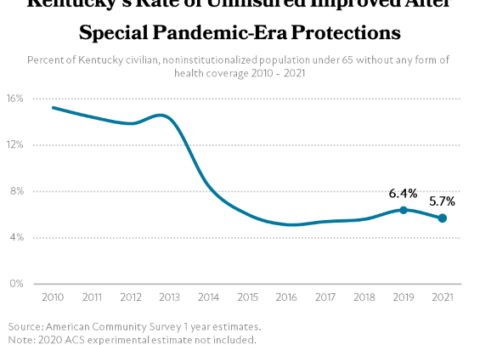Report Release: “Pulling Apart: A State-by-State Analysis of Income Trends”
New Report: Kentucky Among 10 States with Fastest-Growing Income Inequality
Policies Drive Widening Gap Between Low-Income Kentuckians and High Earners
Income gaps widened more in Kentucky than in all but eight other states between the late 1990s and the mid-2000s—and more than all but three other states from the late 1970s to the mid-2000s—according to a new study by the Center on Budget and Policy Priorities and the Economic Policy Institute.
“Whether you’re a corporate executive or a laborer, hard work should pay off,” said Jason Bailey, Director of the Kentucky Center for Economic Policy. “Instead, we’re seeing a Kentucky where the richest households do well while low- and middle-income Kentuckians struggle to maintain their standard of living. This deepening economic divide is harmful to our economy and to our political system.”
The report, Pulling Apart: A State-by-State Analysis of Income Trends, finds declining incomes for low- and moderate-income Kentuckians and substantial long-term income growth for high earners.
- While the average income of the poorest fifth of Kentucky households declined 11.8 percent between the late 1970s and mid-2000s—the worst decline seen in any state—the average income of the richest fifth of Kentucky households grew 61.7 percent over that period.
- In the late 1990s, the average income of the richest fifth of Kentucky households was 7.4 times more than the average income of the poorest fifth, but by the mid-2000s that ratio had grown to 9.1.
- From the late 1990s to the mid-2000s, the incomes of the poorest fifth of Kentucky households declined by 17.2 percent, and the middle fifth declined by 6.2 percent, while the richest fifth of Kentucky households maintained their average income.
Income inequality is rising in Kentucky for a range of reasons, with the growing gap in wages playing a major role. Widening wage inequality is due to such factors as long periods of high unemployment, a decline in better-paying manufacturing jobs due to trade and other policies, and a minimum wage that has not kept up with price increases.
While many of the policies driving income inequality are at the federal level, Kentucky policymakers can do more to address the disparity between the rich and the poor. The state needs to invest more in low-income workers and families and enact reforms that make our tax system fairer.
“The benefits of economic growth have gone disproportionately to high earners,” said Bailey. “State tax policies that shift tax responsibility away from those most able to pay will worsen our already growing inequality, while proposals like an earned income tax credit and a more progressive income tax can help mitigate the problem.”
The joint CBPP/EPI report, as well as a press release and state fact sheets, are available here: http://www.cbpp.org/cms/index.cfm?fa=view&id=3860
###
The Kentucky Center for Economic Policy is a non-profit, non-partisan initiative that conducts research, analysis and education on important policy issues facing the Commonwealth. Launched in 2011, the Center is a project of the Mountain Association for Community Economic Development (MACED).

